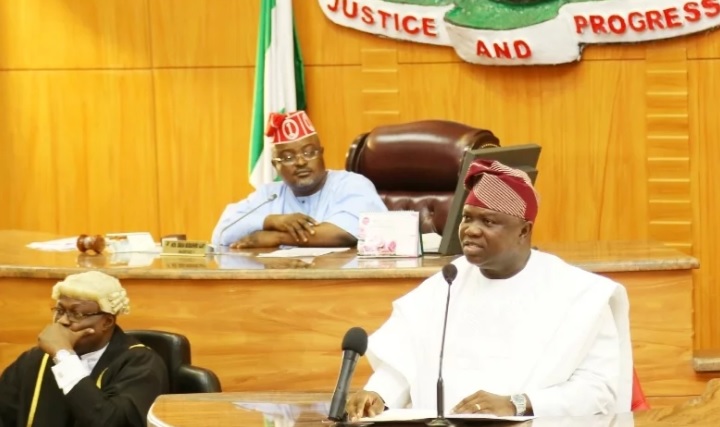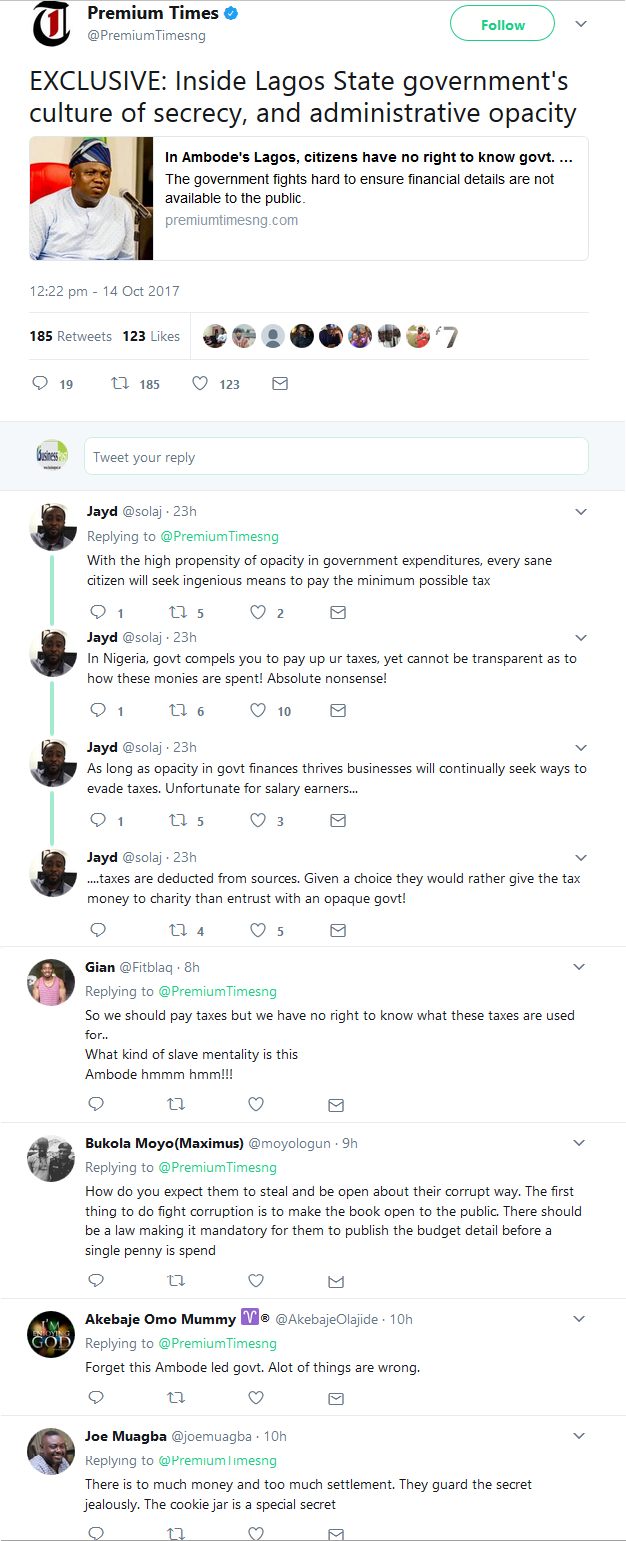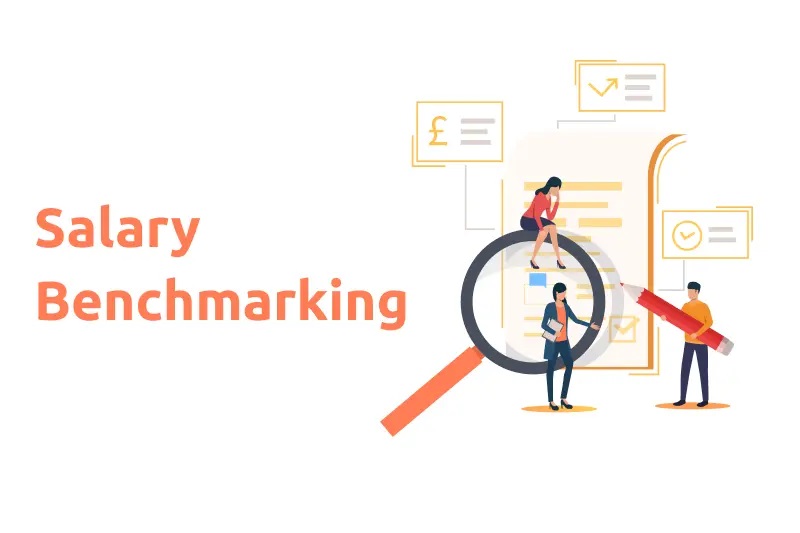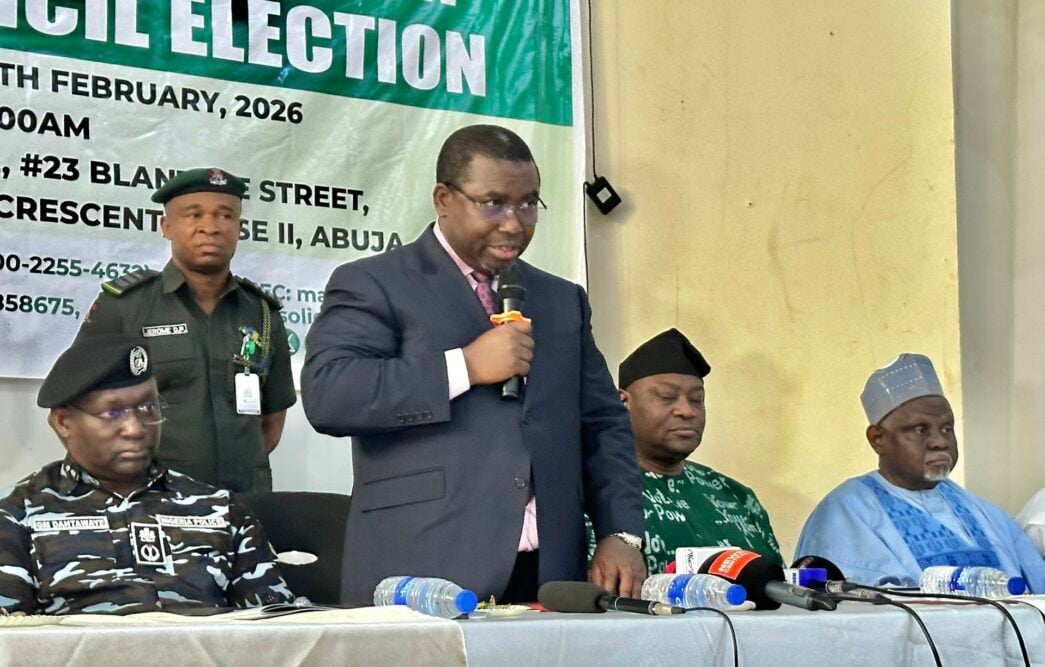General
Ambode Under Fire over Report on Secrecy in Govt. Spending

By Modupe Gbadeyanka
Lagos State Governor, Mr Akinwunmi Ambode, has come under sharp criticisms over a report by an online newspaper, Premium Times, alleging that his administration has not been transparent with taxes of residents.
Those who reacted to the piece said they find it hard to believe that the state government force residents of the state to pay their taxes and threaten to punish them if they fail to comply, but government do not see mandatory to explain how the funds were used.
“In Nigeria, govt compels you to pay up ur taxes, yet cannot be transparent as to how these monies are spent! Absolute nonsense!” a commenter said on Twitter.
Below is the report by Premium Times.
There were smiles on the faces of Governor Akinwunmi Ambode and the two men who sat on both sides inside the Lagos House, Ikeja, as cameras’ clicked while the governor signed the Lagos State government’s N813 billion Appropriation Bill for 2017 into Law.
Flanked by Akinyemi Ashade, the Commissioner for Finance, and Rotimi Olowo, the Chairman House Committee on Appropriation, Mr Ambode said his administration was committed to prudent financial management and would ensure proper fiscal discipline in the implementation of the Appropriation Law.
The budget, the biggest ever by the Lagos State government since its creation, was made up of N507.816 billion earmarked for capital expenditure and N305.182 billion set aside for recurrent expenditure, an aggregate ration of 62:38.
But a breakdown of the budget figures has been kept away from the cameras as well as the public, a marked departure from previous years where even a summary of expenditures and earnings were uploaded on the government’s official website.
“They (Lagos State government) are very tricky about it,” Stanley Achonu, Operations Lead at BudgIT, a civic organisation that helps Nigerians better understand government’s annual budgets.
“What they publish is the summary of the budget, you know, what went to what ministry, it doesn’t include details of the budget.”
For the 2017 fiscal year, both the summary and the detailed breakdown – which had never been publicly disclosed – of the budget is missing on the budget website of the Lagos State government.
Months of efforts to get a clarification from Steve Ayorinde, the Commissioner for Information and Strategy, yielded no results as he neither answered phone calls nor replied text messages.
A silent government
While providing a sectoral breakdown of the state’s 2017 budget last January, Mr Ashade said roads and infrastructure would get N141.692 billion, almost 20 percent of the total budget.
Between February and July, Governor Ambode commissioned over a dozen infrastructural projects, including the Abule Egba and Ajah Fly Overs; the Aboru-Abesan Link Bridge; and the Ojodu Berger Pedestrian Bridge, Lay By, Slip Road and Segregated Bus Park.
Others include the Omotayo Banwo/Kola Iyamolere Street in Ogudu, Kosofe local council; the Admiralty/Freedom Road in Lekki; the pedestrian bridge in Ojota; and a walkway in Jakande, Lekki.
In August, PREMIUM TIMES submitted two requests to the Lagos State government – an official letter requesting information and a Freedom of Information request – seeking the cost of some of these projects, including that of the 20 patrol vehicles procured for the Rapid Response Squad of the Lagos State Police Command.
Although the state government acknowledged receipt of the two letters, there have been no responses two months after.
A similar FOI request months earlier asking for the cost of some projects undertaken by the state’s water corporation was also acknowledged but the information was not provided.
A Subnational Transparency Report published this year by BudgIT listed Lagos State among 16 states in Nigeria without a detailed public budget.
Sectoral allocations in the budget of Lagos State
On March 27, the state government held a “world press conference” where it rolled out activities lined up for the last 50 days of the Lagos@50 celebration – musical concerts, boat regatta, jazz and film festivals, comedy show and the governor’s banquet among dozens of other events – to commemorate the state’s 50th anniversary.
The state government did not also respond to PREMIUM TIMES enquiries about how much was spent on the year-long event.
But in an interview with Punch newspapers last May, Mr Ayorinde, responding to a question on how much the Lagos@50 celebration cost the state government said they received “more than N1 billion” in support from “sponsors.”
“Before the sponsors came, what Lagos did was to give seed money so that things could move. But from sponsors alone, we have raised more than N1bn which is not just going into celebration,” Mr Ayorinde said.
He did not provide details as to how much was the ‘seed money,’ who the sponsors were, and how the funds were disbursed.
Lanre Arogundade, Chairman of the International Press Centre, said the lack of access to public information in Lagos State is a concern for citizens and called for the issue to address urgently.
“Lagos is supposed to be the centre of excellence in everything but when the budget is not easily accessible, that’s worrisome,” Mr Arogundade said.
“We can only talk of high rate of transparency when FOI requests are responded to, when information are made readily available.”
In July, the Social Economic Rights and Accountability Project (SERAP) in conjunction with BudgIT wrote to the state’s procurement agency over the unavailability of public procurement journal to the public.
In a correspondence seen by PREMIUM TIMES, the agency said the governor had just inaugurated its governing board and had just requested to set a threshold for what it would consider as “major contracts.”
It further stated that the agency was working towards a holistic upgrade of its website in order to make it more interactive and advanced in line with international best practices.
“Upon completion of the said upgrade which we hope will be accommodated in the 2018 budget, the agency website will be better positioned to supply adequate responses to enquiries from stakeholders,” the agency stated in its response dated 11th July 2017.
Adetokunbo Mumuni, Executive Director at SERAP, said while his organisation had not had a “serious interaction” with the present government, it had had little success with Mr Ambode’s predecessor, Babatunde Fashola.
In December 2013, SERAP wrote to the Lagos State government requesting information and documents on spendings in public schools, following a $90 million World Bank loan, between 2009 and 2013.
The government did not respond.
In suit FHC/L/CS/57/2014 filed before a Lagos Division of the Federal High Court, SERAP urged the court to declare that by virtue of the provisions of Section 4(a) of the Freedom of Information Act, 2011, the governor is under a binding obligation to provide it with the information requested.
In its counter affidavit, the Lagos State government, represented by then Attorney General and Commissioner for Justice, Ade Ipaye, argued that the Freedom of Information Act was a federal legislation and, as a result, not binding on states.
“The public records of Lagos State government are generated and kept by various ministries, departments, agencies and personnel of the state government in execution of their functions and responsibility in the service of the state,” Mr Ipaye, who is now Chief of Staff to Vice President Yemi Osinbajo, said.
“Such state government agencies and personnel are statutorily created or regulated by laws of the state House of Assembly and the handling of public of public records has serious security implications which are routinely handled by rules established by the state government.”
The court ruled in favour of Lagos State government.
“We’d sought information about the state of primary schools and what they have done; they refused, they insisted that the FOI must be domesticated,” Mr. Mumuni told PREMIUM TIMES.
“We reacted that that shouldn’t be and gave reasons why it shouldn’t be domesticated before such information is made available to us.
“We went to court but we lost. We are still appealing the case.”
In 2014, another division of the federal high court, in Enugu, ruled that the Freedom of Information Act is applicable in all states of the federation.
Hitting a brick wall
This year, Mr Arogundade’s IPC – in collaboration with BudgIT – sought to get a copy of the 2017 Lagos State government budget.
They hit a brick wall.
“I think it’s something worrisome and the issue needs to be taken up… because more can still be done by the government,” Mr Arogundade said.
Last February, a PREMIUM TIMES reporter seeking the Lagos State government’s response to claims by traders at the rebuilt Tejuosho Market in Yaba, was given the run-around by government officials.
First, the market officials directed the reporter to the Public Relations Officer at the state’s Ministry of Commerce and Industry at the Alausa secretariat, where an official redirected him to Lagos State Market Board.
At the Lagos State Market Board at the Old Secretariat in Ikeja GRA, a senior government official who declined to respond to questions directed the reporter back to Alausa, to the LGA Unit of state’s Ministry of Local Government Affairs, where he was referred to the Public Relations Officer.
Bisi Olufuwa, the ministry’s PRO, said she would direct the questions to her boss, the permanent secretary of the ministry.
“I am just seeing this (and you, too) for the first time and I promise to fix a session where you will meet my boss and discuss these issues,” said Ms Olufuwa.
The session was never fixed.

General
Salary Benchmarking To Ensure Competitive Compensation

Salary benchmarking is the systematic process of comparing an organization’s pay rates, bonus programs, and total rewards against market standards. This article walks through why benchmarking matters, how to prepare and run an analysis, the best data sources and tools, and how to turn findings into defensible pay structures and ongoing processes.
Why Salary Benchmarking Matters For Online Businesses And Agencies
Without benchmarking, organizations risk three costly outcomes: underpaying (leading to high turnover and loss of institutional knowledge), overpaying (inflating fixed costs and reducing agility), or misallocating compensation across roles (creating internal inequities and morale problems).
For agencies that pitch retainer-driven services, predictable labor costs tied to market rates enable healthier margins and clearer pricing decisions. For in-house ecommerce teams, benchmarking supports workforce planning when launching new product lines or scaling paid acquisition efforts.
Finally, benchmarking is not only financial: it signals professionalism to candidates.
Key Data Sources And Tools For Accurate Benchmarks
High-quality benchmarking blends public data, commercial platforms, and human intelligence.
Public Government And Aggregated Salary Data
Bureau of Labor Statistics (BLS) or national equivalents provide reliable occupational wage ranges, useful for baseline comparisons and compliance checks.
Industry Surveys, Salary Platforms, And Niche Reports
Platforms such as Payscale, Glassdoor, LinkedIn Salary, and specialized reports for marketing and tech roles give role- and location-specific distributions.
Recruiter Intelligence And Peer Networks
Recruiters and hiring agencies provide real-time insight into candidate expectations and accepted offers. Professional networks, Slack communities, and agency owner peer groups can also offer current market anecdotes that databases miss.
Internal Payroll Data And Turnover Metrics
Historical payroll, hiring velocity, offer-acceptance rates, and exit interview themes help normalize market data against internal realities. Using multiple inputs helps find a defensible midpoint.
How To Conduct A Benchmark Analysis Step By Step
A repeatable process keeps benchmarking actionable and defensible.
- Gather data from at least three sources: one government/aggregate, one commercial salary platform, and one recruiter/peer input.
- Normalize data for location and experience. Convert salaries to equivalent cost-of-living or remote-adjusted values if the company has distributed teams.
- Adjust for total compensation. Include expected bonus, commissions, equity, and benefits to compare total rewards, not just base pay.
- Build a comparison table with target percentiles (25th, 50th, 75th) for each role and highlight gaps vs. current pay.
- Prioritize changes. Use a matrix that weighs business impact, retention risk, and budget feasibility to recommend immediate, near-term, and deferred adjustments.
This framework produces a clear narrative: where pay is behind, how much closing the gap will cost, and which adjustments will most protect revenue and client delivery.
Translating Benchmark Results Into Pay Structures And Budgets
Benchmark results must become predictable pay structures.
Normalize Data For Location, Experience, And Role Level
Apply consistent location multipliers and level definitions (junior, mid, senior, lead) so internal fairness stands up to scrutiny.
Build Pay Bands, Ranges, And Target Percentiles
Create bands with minimums, midpoints, and maximums tied to the chosen target percentiles. Bands help managers make consistent offer decisions and reduce bias.
Model Total Cost Of Hire And Budget Impact
Factor in employer taxes, benefits, onboarding costs, and ramp time. Present scenarios that show both absolute costs and return-on-investment when a higher-paid senior reduces client churn or improves campaign ROI.
Design Salary Bands, Bonus Structures, And Noncash Benefits
Consider sales- or performance-linked bonuses for account managers and revenue-attributed roles. Align Compensation To Performance, Retention, And Career Paths
Tie movements within bands to objective competency milestones (e.g., “strategic link acquisition that improves DR by X points” or “reduced time-to-rank for client cohort”), creating transparent merit progression that drives retention.
Communicating, Implementing, And Ensuring Pay Equity
Change management is as important as the numbers.
Gain Leadership Buy-In And Set Change Management Steps
Present benchmarking findings with clear ROI scenarios and phased implementation options. Leadership will respond to cost/benefit clarity, show how targeted raises stabilize revenue-generating roles.
Communicate Changes To Employees And Handle Pushback
Be transparent about methodology and timelines. Provide managers with scripts explaining why adjustments are happening and how employees can progress to higher bands.
Document Compliance, Pay Equity, And Recordkeeping Practices
Maintain audit-ready records of data sources, decision rationales, and salary matrices. Regularly run pay-equity checks by gender, race, and tenure to avoid legal and moral risks.
Thoughtful communication reduces rumors and ensures raises are seen as strategic investments, not arbitrary rewards.
Ongoing Monitoring: KPIs, Review Cadence, And Market Adjustments
Benchmarking isn’t a one-off. It requires monitoring and simple KPIs.
Track Competitive Positioning, Turnover, And Time To Fill
KPIs should include average comp vs. market percentile, voluntary turnover by role, offer-acceptance rate, and time-to-fill for critical positions. These metrics signal when the market has shifted.
Schedule Regular Reviews And Trigger-Based Market Rechecks
A typical cadence is an annual formal benchmark with quarterly spot checks for priority roles. Trigger-based rechecks, when turnover spikes, when offer-acceptance drops below a threshold, or when the market is disrupted, keep pay competitive between formal cycles.
With a small set of KPIs and a clear review cadence, agencies and online businesses can avoid reactive panic hires and keep compensation aligned with strategy and market reality.
Conclusion
Salary benchmarking equips online businesses and agencies to hire and retain the right talent without sacrificing profitability. When done well, benchmarking clarifies where to invest, makes offers defensible, and reduces turnover among roles that materially affect client outcomes and rankings.
General
BPP Confirms N1.1trn Savings from Procurement Reforms in 2025

By Adedapo Adesanya
The Bureau of Public Procurement(BPP) said the ongoing procurement reforms saved the federal government over N1.1 trillion between January and December 2025.
The Director-General of the bureau, Mr Adebowale Adedokun, revealed this while defending the agency’s 2026 budget before the Senate Committee on Public Procurement in Abuja on Thursday.
The bureau also reported reduced contract approval timelines, additional cost savings, and tougher sanctions imposed on erring contractors and non-compliant government officials.
Mr Adedokun appealed for increased budgetary allocation in 2026 to enhance service delivery, create jobs, and strengthen institutional capacity for procurement oversight.
He further revealed that the bureau received N4.032 billion in 2025 and sought higher funding to reinforce anti-corruption efforts under the administration of President Bola Tinubu.
Earlier, the Chairman of the Senate Committee, Mr Olajide Ipinsagba, a lawmaker from Ondo North, underscored the bureau’s strategic role in driving socioeconomic development and promoting fiscal discipline.
Mr Ipinsagba assured the agency of legislative support while urging strict accountability and prudent utilisation of public funds allocated for its operations.
BPP reforms were committed to deepening transparency, compliance, and efficiency in Nigeria’s public procurement system. Some of them include adherence to a 21-day timeline, as mandated by the Public Procurement Act 2007. Also, the BPP is required to review cases, issue a written decision within 21 working days of receiving the complaints, and state the corrective actions, reasons for rejection, or remedies granted.
There are also plans to streamline approval processes, standardise documentation, and automate workflows to ensure timely and transparent procurement decisions.
General
FCT Council Elections: Police Impose 12-Hour Curfew

By Adedapo Adesanya
The Federal Capital Territory (FCT) Command of the Nigeria Police Force (NPF) has announced a 12-hour restriction on movement across Abuja and its environs ahead of the council elections scheduled for Saturday, February 21, 2026.
In a statement, the Police Public Relations Officer of the FCT Command, Mrs Josephine Adeh, said the movement will be restricted to ensure security and the smooth conduct of the polls.
“The Commissioner of Police, FCT Command, Miller G. Dantawaye, psc., has announced a restriction of movement across the Federal Capital Territory from 6:00 AM to 6:00 PM on Saturday, 21st February, 2026, in view of the scheduled Area Council Elections,” the statement read.
The police clarified that the restriction will apply to all residents, except essential service providers and duly accredited election officials.
The command also called on residents to remain peaceful and cooperate with security agencies.
“The FCT Police Command urges residents to remain peaceful, law-abiding, and cooperate with security agencies to ensure a safe, free, and credible electoral process,” the statement added.
Meanwhile, the FCT Minister, Mr Nyesom Wike, declared Friday a work-free day ahead of the council elections.
In a broadcast, Mr Wike said the decision, approved by President Bola Tinubu, is to enable residents to travel to their communities to vote.
In contrast to the police announcement, the minister declared a separate restriction of movement across the FCT from 8:00 p.m. on Friday to 6:00 p.m. on Saturday, directing security agencies to ensure compliance.
Mr Wike urged residents to turn out in large numbers and conduct themselves peacefully, expressing optimism that the polls would produce leaders who would promote development and stability in the territory.
In the meantime, the Independent National Electoral Commission (INEC) says preparations for the elections are at an advanced stage, with strong voter participation recorded during the PVC collection exercise.
INEC disclosed that 1,587,025 Permanent Voter Cards (PVCs) have been collected across the FCT, representing a 94.4 per cent collection rate out of the 1,680,315 registered voters.
Security agencies have assured residents of adequate deployment across the territory to maintain order, as authorities emphasise the need for a peaceful, free, and credible electoral process.
-

 Feature/OPED6 years ago
Feature/OPED6 years agoDavos was Different this year
-
Travel/Tourism10 years ago
Lagos Seals Western Lodge Hotel In Ikorodu
-

 Showbiz3 years ago
Showbiz3 years agoEstranged Lover Releases Videos of Empress Njamah Bathing
-

 Banking8 years ago
Banking8 years agoSort Codes of GTBank Branches in Nigeria
-

 Economy3 years ago
Economy3 years agoSubsidy Removal: CNG at N130 Per Litre Cheaper Than Petrol—IPMAN
-

 Banking3 years ago
Banking3 years agoSort Codes of UBA Branches in Nigeria
-

 Banking3 years ago
Banking3 years agoFirst Bank Announces Planned Downtime
-

 Sports3 years ago
Sports3 years agoHighest Paid Nigerian Footballer – How Much Do Nigerian Footballers Earn











